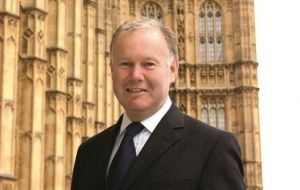MercoPress. South Atlantic News Agency
UK awards 46 offshore hydrocarbons exploratory licences in controversial areas
 Energy minister Charles Hendry said oil and gas contribut3es 2% to UK’s GDP
Energy minister Charles Hendry said oil and gas contribut3es 2% to UK’s GDP UK government has awarded 46 new offshore exploratory drilling licences to firms, including Shell and Centrica, looking for oil and gas. The awards were initially held back due to environmental concerns.
However the government says it is now confident exploring in the regions, including the English Channel, North Sea and West of Shetland, is safe. However environmental groups have criticised the decision saying the drilling may put marine ecosystems at risk.
“There is insufficient data with regards to the complexity of the marine environment in these areas” said Adam Ma'anit from environmental pressure group Platform.
“It is highly irresponsible for [the Department of Energy and Climate Change] to sign off on any concomitant oil and gas expansion in the region.”
However the government says safeguards have been put in place.
“Oil and gas remains crucial to the UK economy - contributing around 2% to the country's GDP,” said energy minister Charles Hendry.
“These further licences have been subject to rigorous examination, and we are now satisfied that initial exploration can go ahead.”
The licences are in the West of Shetland, North Sea Central area, the North Sea Southern area, the English Channel, the North Channel and Morecambe Bay.
But the licensing round, launched in 2010, excluded possible sites in the Moray Firth and in Cardigan Bay, in order to protect marine wildlife, and in the south-west approaches to the English Channel due to a lack of data.
Shell has been offered 6 exploration licences, alongside their partner in the project, Exxon-owned Esso. GDF Suez, Centrica and RWE are amongst the other beneficiaries, who also include a range of smaller exploration companies.
It is not yet known how much oil and gas will be found in the region, but analysts expect the gas reserves may be larger than oil. In the summer, BP announced that it and its partners would invest £3bn in redeveloping two oil fields off the Shetland Islands.




Top Comments
Disclaimer & comment rules-

-

-

Read all commentsCameron is Greenpeace´s fan! people so ignorant!!
Dec 31st, 2011 - 10:46 am 0Might be useful, bearing in mind the dire state of the UK economy, to study closely the Brasilian pattern of ensuring a really high proportion of any revenues accrue to the state. The exploration/extraction companies might not like the RoR but if there is profit in it they will still take up the options.
Jan 01st, 2012 - 11:31 am 0The UK policy of taxing disproportionately the oil/gas UK end-user - the 'man in the street' - as a way of winning state revenue benefit allows too high a fraction of revenues to escape from the UK via the (usually) overseas oil/gas corporations and their shareholders.
. . . . My God! I'm sounding like a Socialist!
I'm sure I did not put socialism on my New Year's resolution list.
It's like waking up from wandering through a dream; but I can't yet figure out if it was a good dream or a nightmare.
Perhaps - after game-changing 2011 - neither socialism or capitalism are appropriate, and only pragmatism rules until a new world-paradigm beds-in.
Geoff I wasn't born until 77 but my understanding of UK fuel taxes is that in the 50's the govt adopted a policy of high fuel taxation because we were dependent on imports and they wanted to reduce waste. For some reason they didn't stop the tax regime when North sea oil was found. One of the reasons UK could be 100% certain of supporting the Falkland Islands in their oil industry if they can't sell elsewhere is that all it would need to do is offer a tax break to oil produced in Falklands and despite the distance travelled the cost to the consumer would be around the same as oil drilled on these shores. Ps I should declare I'm a big believer we should develop alternative fuels but I have zero desire to see retired people prevented from getting around due to fuel costs.
Jan 01st, 2012 - 10:46 pm 0Commenting for this story is now closed.
If you have a Facebook account, become a fan and comment on our Facebook Page!